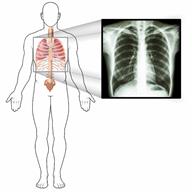ThisisPatientEngagementcontent
Chest X-Ray
Learn more about our Patient Engagement products now! Turn your patients into active participants in their healthcare by giving them easy access to the same evidence-based information you trust – but delivered in an easy-to-understand format.
A chest X-ray is a test that uses radiation to make pictures of the organs in your chest, such as your lungs, heart, and ribs. X-rays can help your health care provider figure out why you have chest pain or a cough.
Chest X-rays are used to look for many health problems. These include:
These steps may vary. Ask what you can expect.
This information is not intended to replace advice given to you by your health care provider. Make sure you discuss any questions you have with your health care provider.
Cookies are used by this site. To decline or learn more, visit our cookie notice.
Copyright © 2025 Elsevier, its licensors, and contributors. All rights are reserved, including those for text and data mining, AI training, and similar technologies.